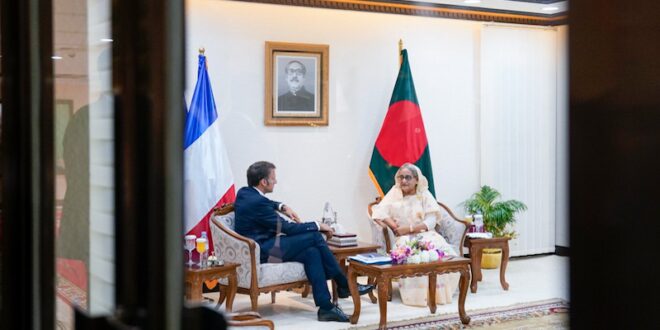French President Emmanuel Macron recently embarked on a two-day diplomatic mission to Dhaka, the capital of Bangladesh, with the primary objective of enhancing bilateral relations. During his visit, President Macron engaged in a meeting with Prime Minister Sheikh Hasina to further solidify the ties between the two nations.
France perceives Bangladesh as a significant collaborator in the Indo-Pacific region. Bangladesh has a geographically advantageous position within the area, characterized by its proximity to neighboring countries such as India, China, and Myanmar, as well as its access to the Bay of Bengal and the Indian Ocean. Bangladesh is characterized as a democratic and secular nation that exhibits shared values and objectives with France, including the promotion of human rights, adherence to the principles of the rule of law, commitment to multilateralism, and dedication to climate action. France aims to assist Bangladesh in promoting its development and enhancing its stability in light of a range of difficulties, including poverty, inequality, terrorism, and natural disasters.
Additionally, it is important to note that Bangladesh has a sizable population and is home to an emerging middle-income group, all of which contribute to the country’s favorable prospects for trade and investment. France has a strong desire to enhance its economic footprint and broaden its commercial reach in the area.
The visit of Macron to Bangladesh was met with a favorable response, as it signified a significant milestone in the relationship between the two nations and the establishment of a strategic alliance. Bangladeshi Prime Minister Sheikh Hasina extended a warm welcome to French President Emmanuel Macron upon his arrival at the Hazrat Shahjalal International Airport in Dhaka. She expressed that his visit presents an opportunity for a distinct approach in a region confronted with emerging imperialistic tendencies amidst the escalating competition between the United States and China. Prime Minister Sheikh Hasina expresses her endorsement of President Macron’s pursuit of strategic autonomy, which is in line with Bangladesh’s foreign policy. This alignment has the potential to provide a new perspective in the realm of international politics, particularly amid the prevailing tensions.
France acknowledges the economic and social advancements made by Bangladesh, including the notable reduction in poverty rates, enhancements in healthcare and education, and notable progress in promoting gender equality and women’s empowerment. France aims to assist Bangladesh in promoting its growth and ensuring stability in several sectors. The French government acknowledges and values Bangladesh’s keenness to acquire French technological advancements and specialized knowledge, including satellite systems, airplanes, water production facilities, and radar systems.
Consequently, as a result of the visit, France has entered into agreements with Bangladesh in the domains of infrastructure development, satellite technology, and aircraft procurement. The aforementioned transaction included Airbus securing a contract to provide Biman Bangladesh Airlines Ltd., the national flagship carrier, with 10 A-350 aircraft. This agreement signifies a significant departure from the airline’s previous reliance on Boeing aircraft, marking the first collaboration between Biman Bangladesh Airlines and the European aircraft manufacturer. Furthermore, it is worth noting that France has the position of being the fifth-largest trade partner for Bangladesh, particularly in the domains of engineering, energy, aerospace, and water industries.
France sees Bangladesh’s economic growth as a favorable and auspicious prospect for bilateral collaboration and commerce. France has a strong interest in expanding its economic influence and broadening its commercial reach in the area. In the year 2021, the nation of France extended a COVID loan amounting to 150 million euros to Bangladesh to bolster its economic recovery efforts and enhance its social protection measures. In addition to the COVID loan, France has allocated a substantial amount of 367 million euros for a green and inclusive economic initiative in Bangladesh. In addition, Bangladesh is seeing diverse investments from France, including a water production facility in Narayanganj valued at 275 million euros and the Lafarge-Surma cement factory with an estimated cost of $253 million.
There were many reasons for Emmanuel Macron’s visit to Dhaka in 2023. Initially, France sought to strengthen its Indo-Pacific policy and provide an alternative approach in a region characterized by conflicting influences from China, Russia, and the United States. France expressed its desire to enhance its bilateral relationship with Bangladesh, a country now undergoing significant economic growth and aiming to broaden its range of alliances. The visit has strengthened the bilateral partnership between France and Bangladesh across all dimensions. The political and strategic engagement between the two nations has been enhanced due to their shared values and interests in the Indo-Pacific region. Furthermore, it has strengthened the collaborative alliance concerning climate change, migration, human rights, terrorism, and multilateralism. Furthermore, the aforementioned agreement has facilitated the augmentation of cultural and intellectual interchange by utilizing an enhanced commitment to bolster scholarships, promote student mobility, and foster academic cooperation.
The visit of the French president has resulted in several advantages for Bangladesh on the international stage. The bilateral relationship between Bangladesh and France has been enhanced, resulting in a stronger strategic partnership. France, as a prominent European power and a permanent member of the United Nations Security Council, has engaged with Bangladesh on several areas of shared concern. France has also declared an extra financial commitment of 1 million Euros towards the World Food Program’s endeavors in the Rohingya camps. France has shown its support for Bangladesh’s sovereignty and autonomy in the development of its foreign policy. The visit has bolstered Bangladesh’s international prominence and standing as a nation undergoing rapid economic and social progress while actively engaging in regional and global affairs.
The recent visit has had a positive impact on Bangladesh’s economic prospects by expanding its market reach and enhancing its economic potential. Notably, Bangladesh has entered into agreements with France about infrastructure development, satellite technology, and aircraft procurement. Additionally, the agreement between Bangladesh and France would facilitate the enhancement of cultural and educational exchanges. This would be achieved via the provision of increased scholarships, opportunities for student mobility, and the promotion of academic collaboration. These initiatives are expected to contribute to the development of mutual understanding and cooperation between the two nations.
The potential impact of French President Emmanuel Macron’s visit to Bangladesh lies in the possibility of alleviating diplomatic pressures faced by Bangladesh from the United States about the forthcoming elections in the country. The visit may serve as evidence of Bangladesh’s many alliances outside the United States, highlighting its autonomy in shaping internal and international policy without relying only on American assistance or endorsement. France, as a prominent European nation and a permanent member of the United Nations Security Council, has considerable influence and authority. Its expression of support for Bangladesh’s accomplishments and political stability has the potential to enhance its international prominence and standing.
In conclusion, the visit has the potential to bolster France’s Indo-Pacific policy, which seeks to foster an equilibrium of power and establish a system based on norms in the area. Furthermore, it might coincide with the interests and values of Bangladesh in the region.
 Eurasia Press & News
Eurasia Press & News




